It’s not often that a superhero comic gives me chills, particularly when we’re talking villains, but then it’s not often you that see a superhero comic from someone like Kate Brown.
Confession: Kate Brown is one of my favourite comic creators. In my other life as a bookseller the most common comics related question I get is, “what graphic novel should I read if I’ve never read comics before?”, and my answer is always this: “Fish + Chocolate by Kate Brown”. (and Karrie Fransman’s The House that Groaned and Hannah Berry’s Adamtine – my unholy trinity now joined by Mary Talbot!)
Brown’s art and storytelling skills are phenomenal, and it doesn’t hurt that in person she is cooler than a whole bag of cucumbers.
Young Avengers too, if you remember from my review of #1, is one of my favourite series of recent years. I’ve been reading along, oohing and ahhing over the ace layouts and gorgeous McKelvie lines, and then #6 popped through my letterbox. By Gillen and Brown. Brown? Brown! OMG.
The first arc of Young Avengers (#1-5) was a non-stop rush as our heroes raced against a very personal big bad. It was great stuff and I loved to hate it for stirring that frustration in me that I always get when I want to shake characters out of themselves (parents!) and bring them to their sense. The feels man, the feels.
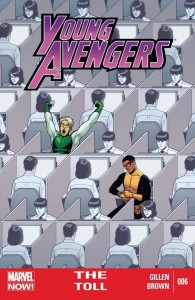
It’s the interactions between these two that leap off the page, Gillen as ever slipping easily into the minds of teenagers and young adults the world over as they chomp noodles and down coffee. Tommy is an amusing gossip, spilling the dirt on his old chums Patriot and Wiccan, while David suffers from having a very old head on those young shoulders. His predicament, being “a genius multiplied by an enormous number” as Tommy puts it, is that he no longer possesses any actual powers. But his knowledge is just wasting away, until perhaps these events give him the kick he needs.
There’s a lot of talking heads here but trust me, you won’t notice. Instead you’ll be at that table with them, running down the corridors or sneaking around in the dark. Tommy’s workday – all five minutes of it – is broken down microchip style to truly illustrate how much work is being done. And how non-superheroic it is.
But then you’ll get to the end. And see fear and shock in eyes in a way that feels realer than it should. A body posed just slightly wrong which tickles all the lizard parts of the brain and makes you think, “fuck run!!”. Shock, agony despair.
I thought Young Avengers had given me all the feels already. But Kate Brown has come in and knocked it outta the damn ballpark. Her beautiful work, pencilled, inked and coloured by herself, works really well with this story and to be honest, I can’t see any reason why it wouldn’t in a non-guest-spot capacity too. I’d dearly love to see more superhero comics embracing lots of different artistic styles…
Often times I know in advance when I’m going to write a review. Other times – and far more rarely – it’s because I’ve literally just finished reading (and re-reading) the issue and I’m still sitting there like O_______O and know I have to share it with everyone. Right now.
Added bonus – never read YA before? This works as a great entry issue too!
Young Avengers #6
Writer: Kieron Gillen
Artist: Kate Brown
Letters: VC’s Clayton Cowles
Cover: Jamie McKelvie, Matthew Wilson
Asst Editor: Jake Thomas
Editor: Lauren Sankovitch
Publisher: Marvel
More of Kate Brown’s work can be found in the Phoenix, the UK weekly comic anthology for all ages and in Fish + Chocolate (and more).


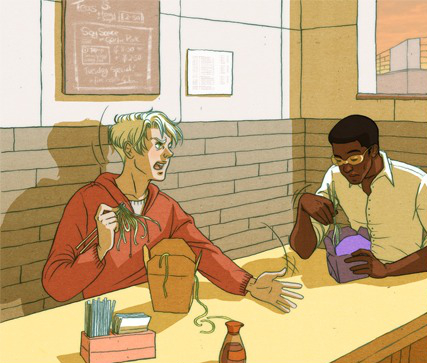
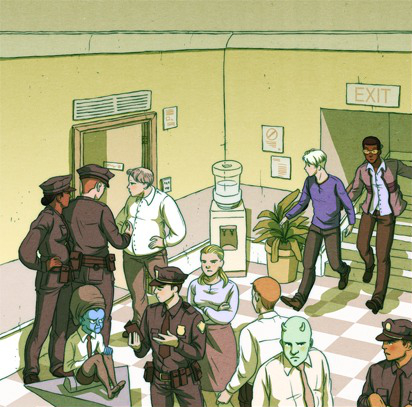
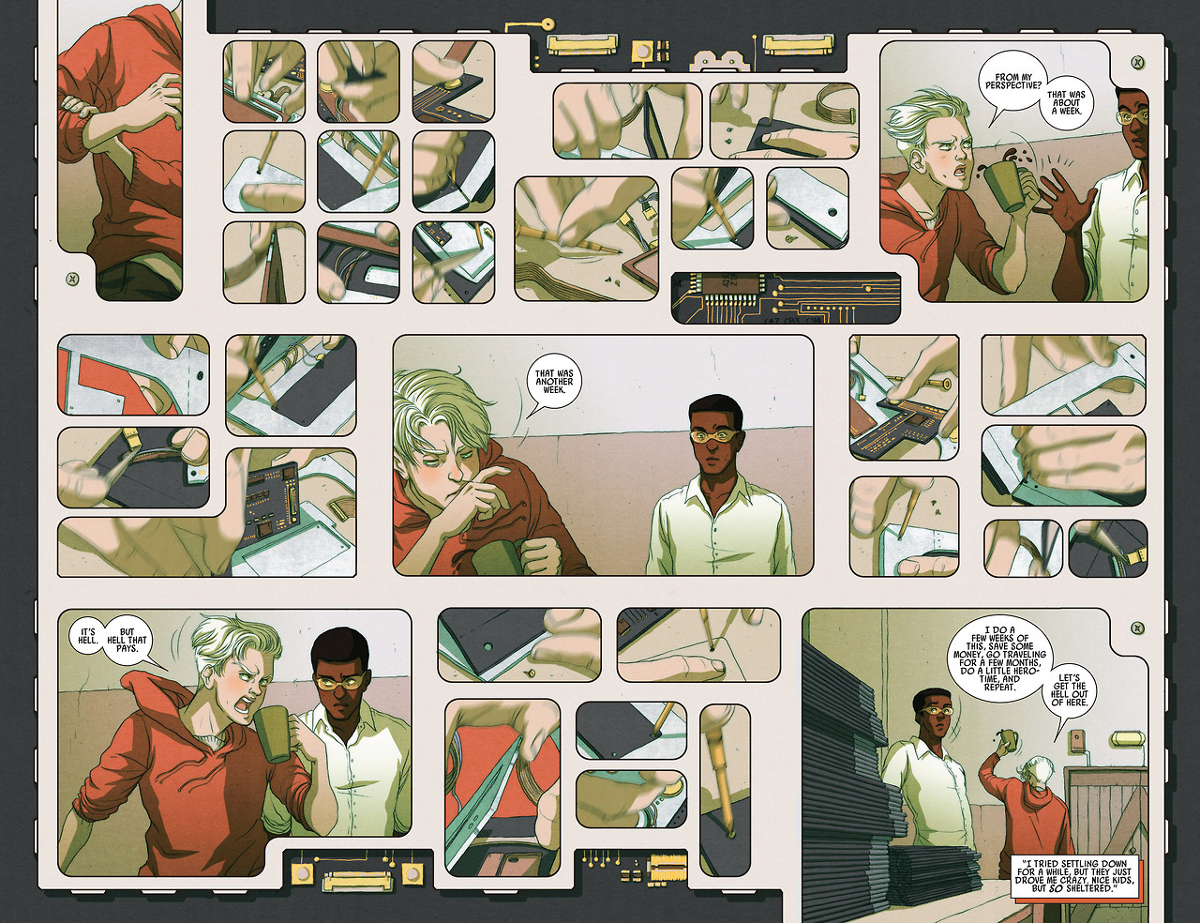
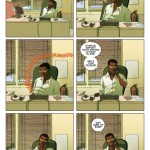
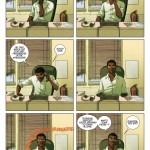
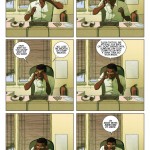
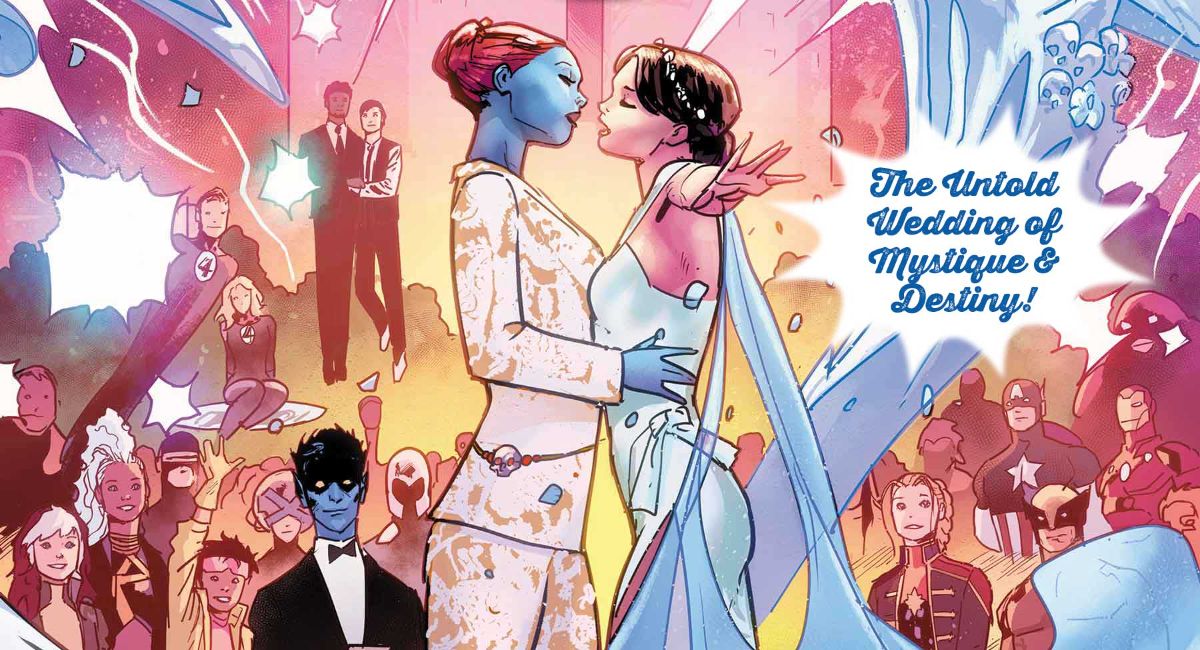

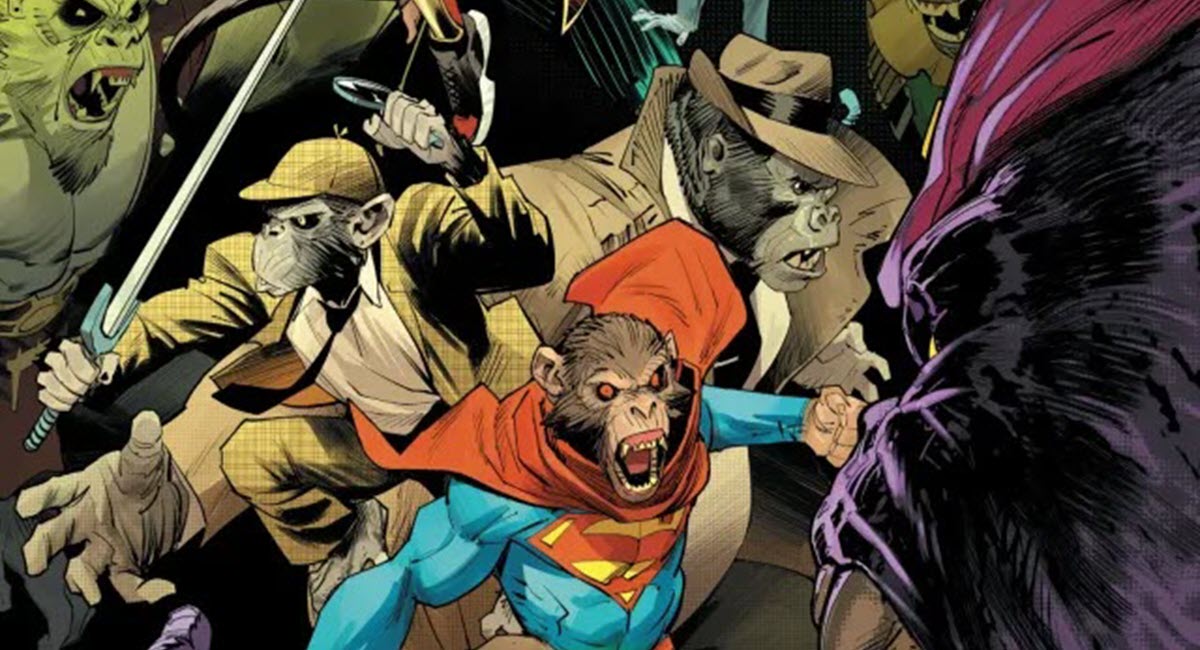



Your enthusiasm for the issue had me thinking, for a second, that I should check out the issue this week. But I caught myself.
As entertaining as the character bits and portrayals are, was there more to the issue than that? Or do Gillen, et al., think that giving the reader appealing characters is enough? Read a mystery; you’ll often get a sleuth with (charming?) idiosyncrasies, a collection of friends, enemies, and others, and a mystery which needs to be solved. Giving the reader a bunch of character sketches is never enough. Practically any writer can do that; his biggest problem is having those characters do something meaningful.
I’m bothered by the thought of Gillen creating a call center for handling superhero event reports. Given that a major problem for superhero fiction writers through the decades has been making the characters and their problems believable, the call center gimmick (vs. having citizens call 911 as usual) takes things in the opposite direction. If a writer can’t figure out what _____ does with his free time when he’s not in a fight, he’s not thinking of _____ as a person. That will be a problem for everybody.
Still, your enthusiasm was contagious and had me going, if only for a second. But I’m 55. Why should someone in his 50s, or 40s, or late 30s want to read about kids when there’s so much else to read? Kids’ lives aren’t interesting.
SRS
To be completely honest if you really think that “kids’ lives aren’t interesting”, then no, this comic probably isn’t for you. But it is about young people with interesting lives, much as YA has always been (and Runaways too).
David is working in a call centre because he has lost his powers and burnt out. He’s depressed and guilty as hell. The call centre shows not only how the Marvel Universe has to bend shape around the existence of superheroes, but sets the tone of David’s inner turmoil. At the same time he’s a man of high intellect working a crummy job – something plenty of (young) people can relate to. Tommy treats his tech job very differently, further illustrating the difference between them.
But you know, spoilers! I think at this point it’s pretty well known that Gillen does a great job at giving us characters that people really care about. Young Avengers (and Kid Loki) has a massive tumblr audience because he and McKelvie have tapped into that illusive magic – the comic that appeals to young and old alike. A comic that has great emotional depth as well as being stylistically pleasing.
I always steer clear of spoilers in my reviews (of new titles at least) because I want readers to experience the comic fresh, so they can get the best of it first time around without knowing what is coming.
I can’t answer why people beyond their late 30s would find such a comic entertaining anymore than I can answer why someone under 30 would find a comic about ancient superheroes who are constantly rebooted interesting. But clearly the fanbase of Young Avengers is pretty wide, and if it is indeed something that people who think kids lives are boring will pass on, then that still leaves a lot of existing readers – and new readers via tumblr – to enjoy it!
Wow, Synisdar. You have constructed a framework for yourself that will only get more narrow with each passing year. When you are 80, will you dismiss stories about people in their fifties? Speaking as a 46 year old man who loves comics, I find stories about human beings to be interesting.
Romeo and Juliet. Hamlet. Pride and Prejudice. Tom Sawyer. Huck Finn. All of these books are about young people; all are classics.
Try to remember what it was like to once be young. It just might open some new doors and opportunities for narrative satisfaction.
Or, keep limiting your options to stories about people your own age, and watch the bandwidth of human connection become increasingly narrow. Your call.
Last I checked, the lives of most adults aren’t don’t exactly make for captivating viewing either. This is why we have storytellers.
Comics like YA are one of the main reasons I’d LOVE to see Comixology release some sales numbers. I’m very curious to see if a book that is definitely aiming for a younger audience is doing well digitally as compared to some of the more established B-list titles.
That was some great art in issue 6. Takes me back to the early 2000s Jemas-era Marvel where they’d get independents and people you might have thought had no interest in drawing a super-hero comic to do a bunch of one-off issues and mini-series.
Aaron – not to mention those stories featuring Spider-Men, Robins, Batgirls, half the X-Men, Supergirl, Teen Titans…
I’d also love to see indie artists make more one-off guest appearances at the least. It really does open it up to a wider audience, helps give those artists more exposure, and is a nice surprise for the readers already following those titles.
I love seeing indie artists doing guest issues of established titles; it is refreshing to read. Sometimes the change can be jarring, as in seeing your Super character drawn in a ‘non-house’ style, (fewer veins showing and a brighter colour palette) but I do purchase those offbeat issues.
Stories featuring kids (young adults), as opposed to a mix of adults and kids, are generally going to be written for kids to read. A sizable difference in ages means a sizable difference in life experiences. If the story is dramatic, adults are going to be faced with relationship crises, moral questions and dilemmas, ethical questions and dilemmas, that a kid would have no idea how to handle. Make the situation life-or-death, requiring adult experience and knowledge to even try to handle it; it’s more likely that the kid would be rendered catatonic by the stress than that he’d be able to handle the dilemma.
Writing kids as being as wise and insightful as adults with equal intelligence and more knowledge about the world is just bad writing. Yes, adults can be prejudiced, biased, and blind to various realities, but in a story, a kid isn’t the best person to point out the adult’s failings. If the writer does have a kid do that, the moral will be so painfully obvious that the adult will have been written as a cretin.
To the extent that writers have adult superheroes deal with situations that any intelligent person could solve, are they being written as adults, placed in situations demanding adult decisions? Probably not.
SRS
“Stories featuring kids (young adults), as opposed to a mix of adults and kids, are generally going to be written for kids to read.”
– Not really, particularly considering many of the comics with teen characters in them and the lack of teens reading them.
“Writing kids as being as wise and insightful as adults with equal intelligence and more knowledge about the world is just bad writing.”
– Plenty of people have to grow up hella fast due to their circumstances and would not appreciate being patronised. They also don’t need to be as “wise” as adults to be as interesting.
I’d give the comic a try before dismissing it based on some kind of age prejudice.
Beauty before age
Comments are closed.